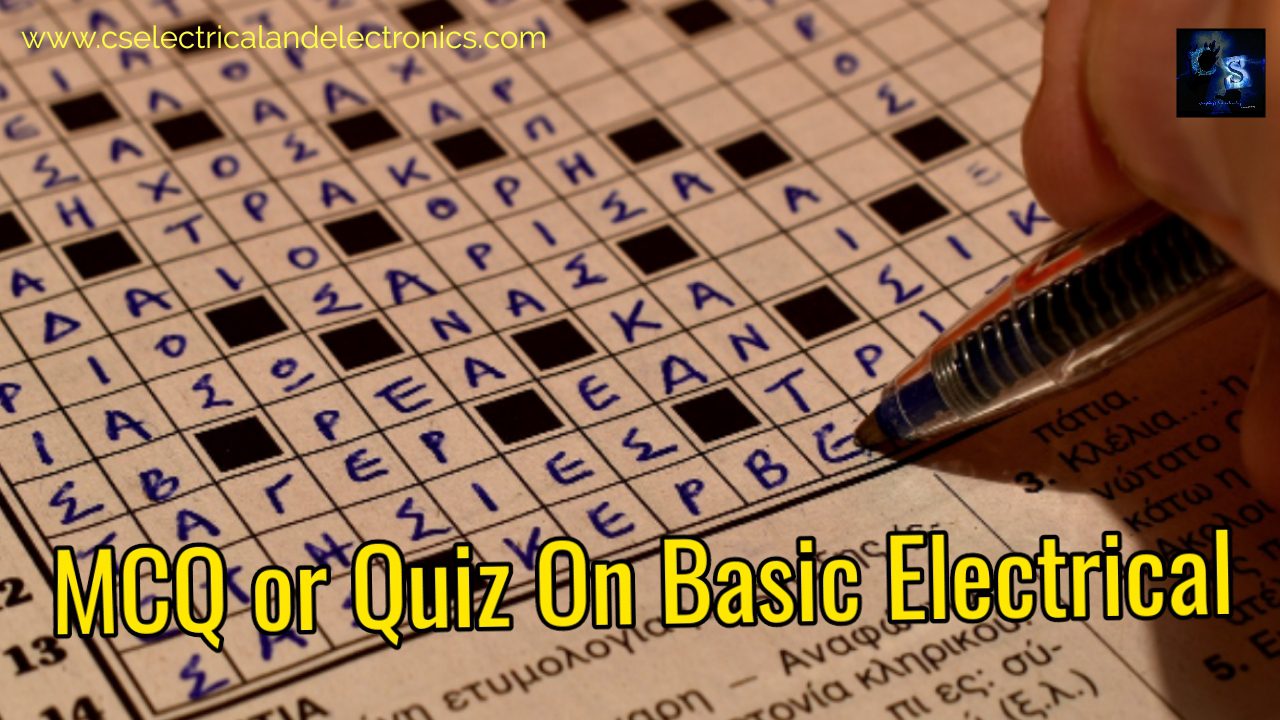MCQ Or Quiz On Basic Electrical
Hello guys, welcome back to my blog. In this article, I will discuss some objective type questions related to basic electrical or electricity, quiz or MCQ on basic electrical. Read this article till the end because the questions which I am discussing above are most repeated in competitive exams.
If you want an article on another topic then comment us below in the comment section. You can also catch me @ Instagram – Click Here.
Also, read – Steps To Prepare For Placements.
Quiz or MCQ On Basic Electrical
01. Ohm’s law is not applicable to
- vacuum tubes
- carbon resistors
- high voltage circuits
- circuits with less current densities
Ans: a
02. Which is the most excellent conductor for electricity?
- Iron
- Silver
- Copper
- Carbon
Ans: b
03. In which of the following option ‘ampere second’ could be the unit?
- Reluctance
- Charge
- Power
- Energy
Ans: b
04. Each of the following is equivalent to watt except?
- (amperes) ohm
- joules/sec.
- amperes x volts
- amperes/volt
Ans: d
05. The following options do not have a negative temperature coefficient is?
- Aluminum
- Paper
- Rubber
- Mica
Ans: a
06. Varistors are?
- insulators
- non-linear resistors
- carbon resistors
- resistors by zero temperature coefficient
Ans: b
07. Insulating elements have the function of?
- preventing a short circuit between conducting wires
- preventing an open circuit between the load and the voltage source
- handling very large currents
- collecting very high currents
Ans: b
08. The rating of a fuse wire is regularly exposed?
- ampere-hours
- ampere-volts
- kWh
- amperes
Ans: d
09. In a series circuit with unequal resistances?
- the more value resistance has the most of the current through it
- the less value resistance has the highest voltage drop
- the less value resistance has the highest current
- the more value resistance has the highest voltage drop
Ans: d
10. The filament used in an electric bulb is made of?
- carbon
- aluminum
- tungsten
- nickel
Ans: c
11. A three Ohm resistor having 2 A current, will consume the power of?
- 2 watts
- 4 watts
- 12 watts
- 8 watts
Ans: c
12. Which of the following description is correct?
- A galvanometer with less value resistance in parallel is a voltmeter
- A galvanometer with more value resistance in parallel is a voltmeter
- A galvanometer with less value resistance in series is an ammeter
- A galvanometer with more value resistance in series is an ammeter
Ans: c
13. If in the mainline parallel circuit is opened, then the current?
- increases in the part of the lowest resistance
- increases in each branch
- is zero in all parts
- is zero in the highest resistive part
Ans: c
14. If a wire of 0.2-ohm resistance is doubled in length, its resistance will be?
- 0.4 ohm
- 0.6 ohm
- 0.8 ohm
- 1.0 ohm
Ans: a
15. Three 60 W bulbs are in parallel over the 60 V power supply. If one bulb blast then?
- there will be heavy current in the mainline
- rest of the pair bulbs will not glow
- all three bulbs will light
- the other two bulbs will light
Ans: d
16. The five bulbs of 40 W each are combined in series swift a battery across them, which of the following statement is correct?
- The current into each bulb in same
- The voltage across any bulb is not the same
- The power distribution in each bulb is not the same
- None of the above
Ans: a
17. Two resistances Rs and Rp are connected in series over the voltage source where Rs>Rp. The biggest drop will be across which resistor?
- R 1
- Ri
- either Rl or Ri
- none of them
Ans: a
18. A closed switch has a resistance equal to?
- zero
- about 50 ohms
- about 500 ohms
- infinity
Ans: a
19. Heat in a conductor is produced on the passage of electric current due to?
- reactance
- capacitance
- impedance
- resistance
Ans: d
20. The insulation at a current-carrying conductor is done?
- to stop leakage of current
- to prevent shock
- both of the above factors
- none of the above factors
Ans: c
I hope this article may help you all a lot. Thank you for reading,
Also, read:
- Hazard Identification Techniques In Functional Safety (FuSa) ISO 26262
- Troubleshooting CAN Communication Failures In A Test Environment
- Code Generation In MATLAB Simulink, Things To Be Followed For Efficient Code Generation
- Variable-Step Solvers In MATLAB Simulink: Which One To Select
- Fixed-Step Solver In MATLAB Simulink: Which One To Select?
Tags: Electrical Objective Questions Related To Electricity Or Basic Electrical, quiz, or MCQ on basic electrical.

